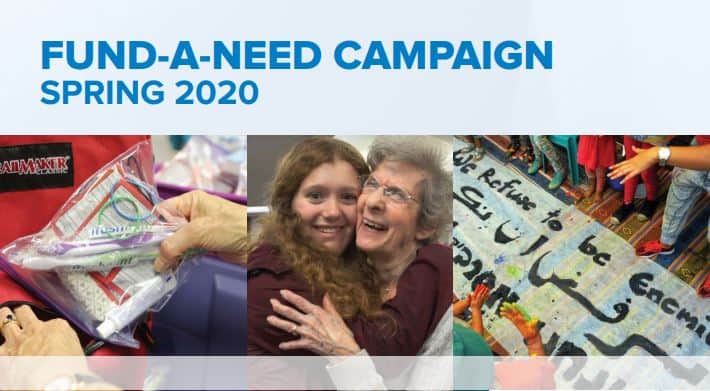In the early weeks of this sheltering experience, I’d find myself getting a little bit annoyed by some of the posts I was seeing online. There was, and is, a certain amount of “competitive suffering” going on; a sense that the particular circumstances in which I was under lockdown (or not) were worse than yours.
As I sat with these, and in some moments felt unseen in the specific ways that this has been hard for me, I came to recognize and name for myself that everyone is suffering right now, each in our own way (ok, maybe not so much the guy on his yacht trying to find a safe harbor in the Caribbean, but almost everyone). We gain nothing by engaging in competitive suffering. We gain everything by recognizing and affirming everyone’s pain right now, acknowledging what each of us is dealing with, and giving support in whatever ways we are capable.
However, still, this pandemic and our society’s response have in fact exposed cracks in our society that opened gaping chasms amidst COVID-19.
That “essential” work rest heavily on low-paid workers, many without paid sick leave, lifts up disparities in our economy and in the protections available based on status and class. That this virus has impacted communities of color far in excess to their percentage of the population lifts up the enduring impact of racial disparities and health. Even within the Jewish community, the virus appears to have impacted Haredi communities – many living with larger families in smaller apartments and with fewer economic resources – far harder than some of the rest of us.
Yes, these and other fractures in our society existed before this, but COVID has made their impact far more visible and thrust them more visibly into our public consciousness (with the help of some very skilled organizing and pushing by advocates in impacted communities).
I’ve been thinking about the days and years after Hurricane Katrina, in 2005, another time when disaster exposed the chasms of our society (and may I recommend Floodlines, a fantastic podcast miniseries produced by The Atlantic that dropped just as COVID-19 was shutting us down). About a week after the hurricane, I attended a meeting of some of the nation’s largest Jewish family foundations and leaders from many of the Jewish federations. The Jewish communal system had quickly raised well over $20 million to support recovery and rebuilding, with the goal of ensuring that every synagogue and Jewish camp in the Gulf would have the capacity to do so.
I remember the president of one family foundation – widely known and rightly credited for its visionary and extraordinary investment in creating Birthright Israel and other Jewish identity and education projects – challenging the assembled leaders: “How could we ignore the vast disparities in the impact of Katrina?” he asked. “We will be defined not just by what we do for ourselves, the Jewish community, but also by what we do for others, for all those struggling to recover.”
In the hours that followed, the federation system, led by its national office and a few extraordinary communities, including CJP here in Boston, set aside substantial resources (millions of dollars) to be specifically designated as Jewish support for recovery of other parts of the Gulf community, with the money channeled through the organization I was working for at the time, Jewish Funds for Justice. With Jewish communal capital, followed in coming months by six and seven figure gifts from philanthropists of various political and ideological stripes, we launched the Isaiah Fund. This fund was an interfaith partnership to build homes and support economic recovery in New Orleans. We established a grants fellowship for community organizers from African-American, native tribes, Vietnamese fishing communities, and other hard-hit populations. And we created a range of service programs bringing Jewish college students and young adults to those communities to help.
I look back at that work, and the six years in which I was privileged to lead the Fund’s program team in a Jewish response for all of Katrina’s victims, on behalf of the Jewish federation movement, as one of the proudest moments of my career before coming to Boston.
I hope that, once again, we will meet the challenge of this moment. It’s a different moment of course – far more all-encompassing in the national and global reach of this crisis. Our Jewish community is suffering profoundly. And yet, I know that when we have the will, we have the capacity to remember that everyone is in pain, that we are all suffering and that it is in our collective interest to rededicate our efforts to healing the chasms of our society before they engulf us all.
I hope that you will join us in that work.
Shabbat Shalom,
Jeremy
P.S. Join JCRC’s Fund-a-Need Campaign!We’re raising funds to benefit JCRC’s vital programming in our efforts to combat hate, stand with immigrants and our most vulnerable neighbors, promote peace for Israel, and engage our community in service





